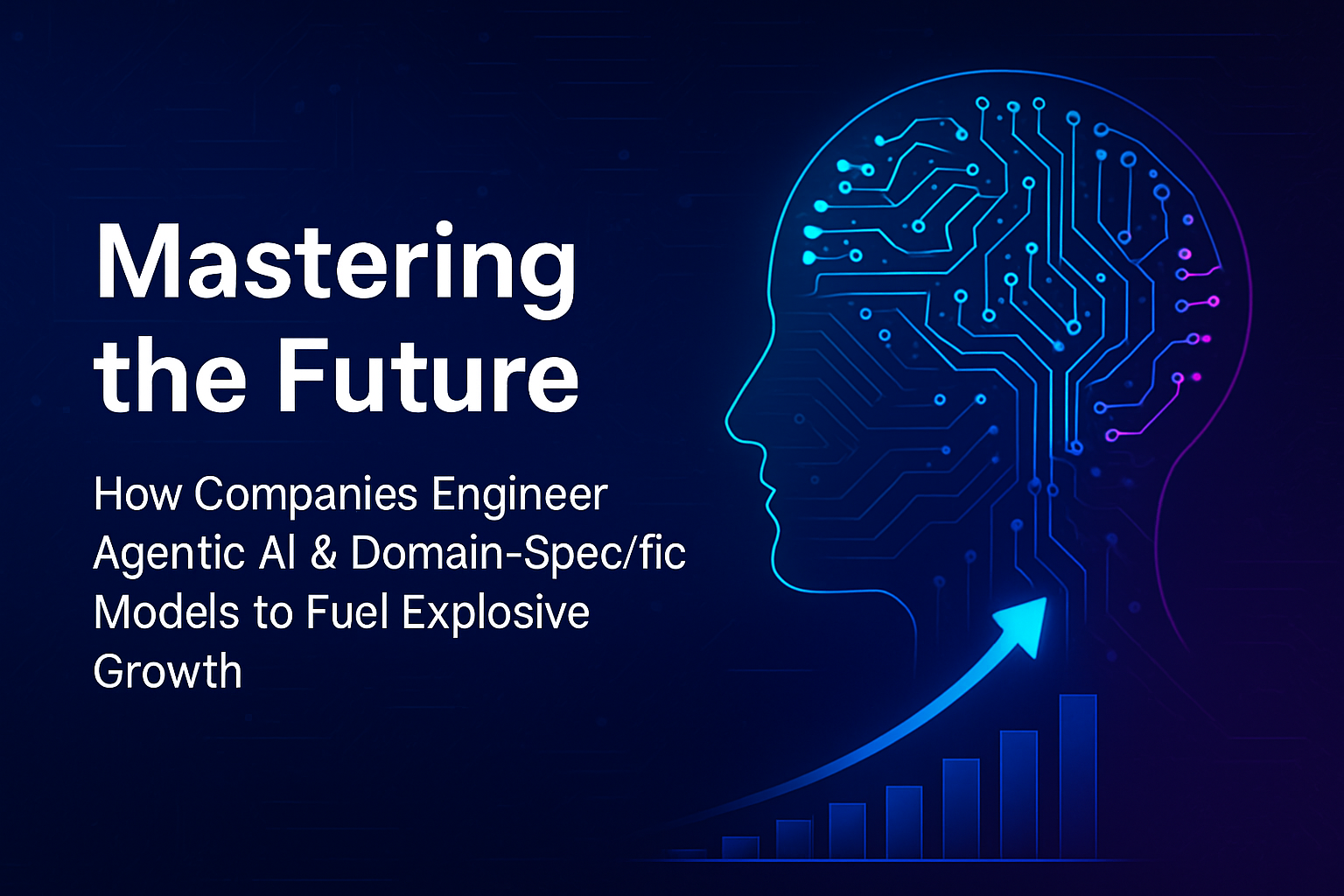
Introduction: The Rise of Agentic AI and Domain-Specific Models
We’re witnessing a revolution in artificial intelligence — but not the one most people think. While general-purpose AI like ChatGPT grabs headlines, a quieter yet far more profound shift is happening behind the scenes: companies are engineering highly specialized, agentic AI and domain-specific models to supercharge growth. This isn’t science fiction. It’s how businesses are reshaping industries, gaining competitive edges, and rewriting the rulebook of innovation.
Let’s dive deep into how companies are building these powerful systems — and why this might be the most important transformation in AI since its inception.
The Evolution of AI: From General AI to Specialized Intelligence
When artificial intelligence first entered the mainstream, the dream was simple: one machine that could think and do everything a human could. But the reality turned out a little different. General AI is impressive but often too broad to handle the intricate needs of specific industries.
Over time, companies realized that specialization beats generalization in most business contexts. That’s where domain-specific AI and agentic systems step in — offering laser-focused intelligence tailored for niche markets.
What Exactly is Agentic AI?
Agentic AI goes beyond just processing data or predicting outcomes. Think of it like hiring a highly trained digital employee who not only understands its tasks but actively makes decisions, learns from its environment, takes proactive steps, and optimizes itself continuously.
In simple terms:
Agentic AI = Decision-Making + Autonomy + Adaptation.
Instead of waiting for instructions, agentic AI autonomously interacts with data, customers, systems, and other AI models to achieve a goal. It’s like giving AI a mission — and it figures out how to execute it.
How Agentic AI Differs from Traditional AI Models
Most traditional AI models are reactive. You give them a prompt or dataset, they return a result. That’s it.
Agentic AI operates differently. It involves:
-
Autonomous Goal Pursuit: Sets and pursues objectives.
-
Multi-Step Reasoning: Breaks complex tasks into smaller actions.
-
Environment Awareness: Interacts with multiple systems in real-time.
-
Continuous Learning: Self-improves over time based on outcomes.
This proactive behavior makes agentic AI perfect for dynamic business environments where conditions change constantly.
The Growing Importance of Domain-Specific AI Models
Generic models might know a little bit about everything, but domain-specific models go deep. These models are trained on highly curated data relevant to a particular industry, business, or function.
For example:
-
In healthcare: Diagnosing diseases based on patient history.
-
In finance: Managing portfolio risks and predicting market shifts.
-
In logistics: Optimizing supply chain routes based on weather and fuel prices.
-
In law: Parsing legal documents to extract case-relevant data.
The depth of knowledge domain-specific models bring enables them to deliver far superior performance compared to general-purpose AI.
Why Generic AI Often Falls Short in Business Applications
Let’s face it — businesses don’t operate in theory. They live in complex, highly specialized ecosystems with countless variables that general AI models struggle to fully grasp.
For instance, asking a generic chatbot legal advice may yield very generic answers, but a law-trained AI model can navigate complex legal frameworks and jurisdiction-specific nuances.
The lack of contextual expertise is where general AI models hit a wall. That’s why domain-specific models become essential for serious business operations.
The Business Case for Agentic AI and Domain-Specific Models
Why are companies pouring billions into developing these systems? Simple: they work.
-
Hyper-personalization: Delivering customized customer experiences.
-
Operational efficiency: Automating complex workflows end-to-end.
-
Revenue growth: Unlocking new products and services.
-
Risk mitigation: Identifying issues before they become costly.
-
Competitive advantage: Outperforming slower, less agile rivals.
In a world where speed and precision matter, agentic and domain-specific AI becomes the ultimate force multiplier.
Building Blocks of Agentic AI: Core Components Explained
Creating an agentic AI isn’t just about fancy algorithms. It requires a robust architecture that includes:
-
Autonomous Agents: Software entities with defined goals and learning capacity.
-
Orchestration Engines: Coordinate multiple agents working together.
-
Knowledge Graphs: Structured, relational data that simulate real-world contexts.
-
Feedback Loops: Systems that capture outcomes and feed improvements back into the model.
-
Real-Time Data Streams: Constantly updated information that allows the AI to adapt on the fly.
This architecture turns AI from a passive tool into an active business participant.
Data: The Lifeblood of Domain-Specific AI Models
You can’t build intelligence without knowledge — and that means data.
Domain-specific models thrive on:
-
Curated historical data from the industry.
-
Proprietary internal data owned by companies.
-
Real-time market feeds that inform the AI’s decision-making.
-
Human expertise encoded into rules and frameworks.
The richer and more relevant the data, the smarter the model becomes.
Model Training: Tailoring AI for Specific Business Needs
Training domain-specific models isn’t just about throwing data at an algorithm. It requires:
-
Preprocessing: Cleaning, labeling, and organizing data.
-
Fine-tuning: Adjusting model parameters for optimal domain performance.
-
Testing: Running simulations to identify weaknesses.
-
Iteration: Continuously improving the model based on feedback.
This meticulous training process ensures the AI delivers high accuracy and relevance for real-world applications.
Human-in-the-Loop: Blending AI with Human Expertise
Even the smartest AI needs human oversight. That’s where the Human-in-the-Loop (HITL) approach shines.
Humans provide:
-
Ethical judgment
-
Nuanced decision-making
-
Oversight of high-stakes tasks
-
Domain expertise refinement
This partnership creates a symbiotic relationship where AI handles the heavy lifting, and humans guide the final outcome.
Real-World Applications of Agentic AI Across Industries
The applications of agentic AI are nearly limitless. Here’s how industries are using it:
-
Healthcare: Personalized treatment planning, drug discovery, patient monitoring.
-
Finance: Fraud detection, real-time trading, compliance automation.
-
Retail: Dynamic pricing, inventory forecasting, AI-powered customer service.
-
Manufacturing: Predictive maintenance, process optimization, quality control.
-
Transportation: Autonomous logistics, route planning, demand forecasting.
Each application showcases how specialized knowledge + autonomy = exponential value.
Challenges in Building and Deploying Agentic AI
Of course, building these advanced systems comes with serious challenges:
-
Data privacy concerns
-
Model bias and fairness
-
Explainability and transparency
-
Scalability issues
-
Regulatory compliance
-
High development costs
Companies must navigate these hurdles carefully to unlock agentic AI’s full potential.
How Startups and Enterprises Approach Agentic AI Differently
Startups often:
-
Move faster with limited resources.
-
Focus on narrow niches.
-
Innovate through agile experimentation.
Enterprises, on the other hand:
-
Leverage massive proprietary datasets.
-
Build large-scale, enterprise-grade solutions.
-
Prioritize regulatory compliance.
Both approaches bring unique strengths to the AI landscape.
The Role of Low-Code and No-Code Platforms in Domain-Specific AI
The rise of low-code/no-code platforms is democratizing AI development:
-
Business teams can train models without writing complex code.
-
Rapid prototyping allows faster iteration cycles.
-
Integration with existing business systems becomes seamless.
This opens doors for smaller companies and non-technical users to build domain-specific models tailored to their unique needs.
The Ethical Dimension: Responsibility and Bias in Agentic AI
With great power comes great responsibility. Agentic AI raises serious ethical questions:
-
How do we prevent biased decision-making?
-
Who’s accountable for AI-generated actions?
-
How do we ensure transparency in autonomous systems?
Responsible AI design must incorporate bias mitigation, auditability, and clear accountability frameworks from the start.
The Future of Business Growth Powered by Agentic AI
The companies that master agentic AI and domain-specific models aren’t just gaining an edge — they’re rewriting how entire industries operate.
Imagine:
-
Banks operating with real-time, AI-powered risk management.
-
Hospitals where treatment plans evolve dynamically for each patient.
-
Supply chains that adapt instantly to market disruptions.
-
Customer service agents that resolve issues before customers even notice them.
The future isn’t about replacing humans — it’s about augmenting human capabilities to previously unimaginable levels.
Conclusion: Embracing the Agentic AI Revolution
We stand at the edge of a new AI frontier. Agentic AI and domain-specific models aren’t some distant future — they’re already transforming businesses today. The companies that invest now, that dare to build specialized, autonomous, and highly intelligent systems, will shape the next era of global innovation.
Those who wait may find themselves left behind as this new breed of AI-powered competitors redefine what’s possible.
FAQs
Q1: Is agentic AI the same as autonomous AI?
Not exactly. While both involve autonomous behavior, agentic AI specifically emphasizes goal-driven, proactive decision-making within a defined domain or mission.
Q2: Can small businesses build domain-specific AI models?
Yes! Thanks to open-source models, pre-trained frameworks, and no-code platforms, even small businesses can develop tailored AI solutions today.
Q3: What industries benefit the most from agentic AI?
Finance, healthcare, logistics, manufacturing, and retail are currently seeing some of the biggest gains from agentic AI systems.
Q4: Is human oversight still needed in agentic AI?
Absolutely. Human-in-the-loop approaches remain essential to ensure ethical, accurate, and responsible AI behavior, especially in high-stakes environments.
Q5: How fast will agentic AI be adopted across industries?
We’re already seeing rapid adoption. Over the next 5–10 years, expect agentic AI to become a core part of business operations across nearly every sector.

